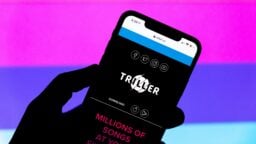Video-sharing social networking service Triller, the US-based challenger to TikTok, says that it is exploring revenue share deals with major labels.
According to a Triller spokesperson, the platform is currently “assessing” what it calls a “Spotify-like model”, which, they add, would include “a revenue share versus large cash payments as our agreements come up for renewal”.
Such a move from Triller would follow similar steps taken by the likes of Meta, which announced a ‘revenue-share’ model for user-generated video content back in July.
Meanwhile, Bloomberg recently reported that the three majors are currently asking Triller rival TikTok for a share of advertising revenues generated on its platform in their deal negotiations.
News of Triller’s rev-share plans arrives on the same day (Friday, December 2) it was reported that Triller has removed the catalogs for Warner Music Group, Sony Music Entertainment, and Universal Music Group, as well as for Merlin, which represents prominent independent labels and distributors.
Today’s news also comes three months after Sony Music Entertainment hit Triller with a lawsuit claiming that the platform used its recordings without a license, as well as “fail[ing] and refus[ing] to pay millions of dollars in contractual licensing fees”.
In a statement issued to MBW on Friday (December 2), a Triller spokesperson confirmed, “that we are taking down Merlin music”, but claimed, that “of the three major labels, Sony is the only one we do not have a current agreement with and haven’t renewed”.
“We have a dispute with Sony over 2 million dollars, a dispute which will be decided in the court system,” they added.
Commenting on Merlin specifically, they claimed that: “Most of Merlin’s music is indie rock and dance; both genres which [have] a lower interest on the Triller app. It therefore makes no sense for Triller to continue spending tens of millions of dollars a year for music virtually no one uses on Triller.”
The Triller spokesperson continued: “The accusation that we are taking down music because of millions of unpaid royalties is simply not true. We have current active agreements with Universal and Warner Music which is more than 65 percent of the used popular music.
“We are hopeful and optimistic that when these deals expire we can come to arrangements that do not involve tens of millions in annual payments rather a revenue split.”
The statement from Triller’s spokesperson on Friday confirmed, however, that “we actively have removed a portion of major label music, as our deals come up, and are assessing each renewal as they come up, each on a case by case basis.
They added: “As we approach being a public company, this move saves Triller tens of millions of dollars per year, without taking away anything from the user experience or hurting our numbers.”
In October, Triller confirmed that it had secured a binding USD $310 million investment from GEM (Global Emerging Markets), a Luxembourg-based alternative investment group.
Confirming the deal, US-based Triller reiterated that it expected to execute a public listing on the stock exchange in Q4 2022, and claimed that it’s on track to clear $100 million in revenue this year.
In June, Triller announced that it had filed an S-1 form with the SEC for an IPO on the Nasdaq. At the time, it stated that its listing was “expected to be approved by Q3″.
That June announcement itself came shortly after Triller announced it was scrapping another planned IPO – this time via a merger with Seachange – which was initially expected to “close in Q1 2022”.
You can read Triller’s statement in full below:
The article seems to rehash a lot of old stuff that was already settled and resolved and is 90 percent old news with nothing of relevance. It you would like comment on those as well please let us know, but we do find it interesting/curious that each of the issues raised was resolved fully and settled, and yet that isn’t quite clear in the Billboard story. The only new news being that we are taking down Merlin music.
The accusation that we are taking down music because of millions of unpaid royalties is simply not true. We have current active agreements with Universal and Warner Music which is more than 65 percent of the used popular music. We are hopeful and optimistic that when these deals expire we can come to arrangements that do not involve tens of millions in annual payments rather a revenue split.
As to Triller taking down music in general, we can confirm we assessed the app usage and a very small percentage of our users use the major label music as most of our users enjoy to make their own content with OG sounds and to upload on their own.
Most of Merlin’s music is indie rock and dance; both genres which has a lower interest on the Triller app.
It therefore makes no sense for Triller to continue spending tens of millions of dollars a year for music virtually no one uses on Triller. Of the three major labels, Sony is the only one we do not have a current agreement with and haven’t renewed. We have a dispute with Sony over 2 million dollars, a dispute which will be decided in the court system.
We actively have removed a portion of major label music, as our deals come up, and are assessing each renewal as they come up, each on a case by case basis. It has not changed our app usage as all. The numbers speak for themselves.
As we approach being a public company this move saves triller tens of millions of dollars per year, without taking away anything from the user experience or hurting our numbers. Quite the opposite it increases our bottom line by 30 plus million dollars per year.
We are assessing a “Spotify-like model”, which would include a revenue share versus large cash payments as our agreements come up for renewal.
This model would give our users the flexibility to have the music if they chose, outside of OG Sounds, without us paying for music the majority of users don’t use. Sans thatour users have made clear the value of this music does not justify the tens of millions a year in cost. “
At the start of October, Triller settled a separate lawsuit with Timbaland and Swizz Beatz; the producer duo alleged that they were owed missed payments following Triller’s acquisition of their song battle platform Verzuz in 2021.Music Business Worldwide




